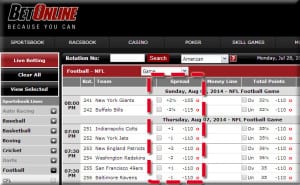Point Spreads Explained
The point spread is one of the most popular bets in sport and week in – week out there is a lot of talk about the spread, and where it should be. Here you’ll see what the point spread is and how it is worked out, followed by an explanation of betting the point spread, finishing with some advice on finding the best lines.
What is the point spread?
The point spread bet is a bet designed to give each team an equal chance of winning a particular game. Obviously, not all teams are equal, so the sports-books have devised a mechanism to even up the teams, and that is by taking points/runs/goals off the team who is favored. The more a team is favored, the more the gambling site will take off them, enough to theoretically make the game a 50/50 chance.
How the point spread is worked out
Sportsbooks will use a variety of methods to set their line on a game. Some firms will use computer simulations, some will use a form of power ratings, some will use an experienced team to set the line – some may even use a combination of all three. Other books may even wait to see where their rivals set their lines before dipping their toe in the water themselves.

Having set the point spread, this is the point where the gambling public can influence the line. You might have noticed that a line five days before a game might look very different to the line an hour before the kickoff. Barring some major line-up changes due to injuries or suspensions, the line will most likely be moved by weight of money. If the majority of money is coming in on one side of the point spread, the book will move the line to make the bet a little less attractive, which will help them level the book up somewhat.
Betting the Point Spread
A typical point spread bet might look like this:
Seattle Seahawks -4.5 -110
Miami Dolphins +4.5 -110
Here, the Seahawks have been evaluated as 4.5 point favorites. This is essentially the sportsbook saying that they think that if the Dolphins were given a 4.5 point start, that the game is now completely even, and either team has a 50% chance of winning.
Here, if you want to back the Seahawks to beat the spread, you are backing them to win by more than the 4.5 points they are favored by. The odds here are -110, which means that if you were to wager $110 on the Seahawks here, you’d win $100 if they do indeed beat the spread.
If you want to back the Dolphins to beat the spread, you can win in one of two ways – firstly by the Dolphins winning the game, or the Dolphins losing by less than 4.5 points. If the Dolphins lose by three for example, they still beat the spread. Once again you’ll need to wager $110 to win $100 here.
Does overtime count in a point spread?
All point spread bets include overtime.
Here are some examples of how the spread might be won in this game:
- Seahawks 35 Dolphins 17 – Seahawks beat the spread by 13.5 points
- Seahawks 21 Dolphins 18 – Dolphins beat the spread by 1.5 points
- Seahawks 34 Dolphins 28 OT – Seahawks beat the spread by 1.5 points
- Seahawks 11 Dolphins 18 – Dolphins beat the spread by 11.5 points
- Seahawks 17 Dolphins 14 OT – Dolphins beat the spread by 1.5 points
On occasions the point spread will be a whole number, for example eight, which means that it is possible for the game to end in a tie after the point spread has been applied. If the game does indeed end in a tie, then the bet will be considered a push, and your stake will be returned with no winner and no loser.
The Point Spread – Finding the Best Line
It is a very good idea to shop around to find the best line when you are betting on sports. Books may offer slightly different lines, and you might be able to gain a point or half a point in your favor on certain markets. Consider an NBA game between the Heat and the Lakers – one firm has the Heat 9.5 point favorites and another have the Heat as 8.5 point favorites. You back the Heat with the second firm and they win by exactly nine points. Here you’ve gone from a loss to a win simply by shopping around, and in the long run this will make a big difference to your bottom line.
Another thing to consider is popular winning margins, which are particularly applicable to football. Consider that many tight games may finish with either a three point or a seven point margin. If the point spread is around either of these marks, make every attempt to be the right side. For example, if you were to back a team that is either 2.5 or 3 point favorites, you’d want to back them at the 2.5 mark, as if they were to win by 3 you’d win as opposed to a push.

Pretty good explanation of the spread. For some people it is very hard for them to grasp.
0